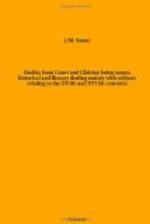They wished to be called deists; not because they favoured any particular form or system of religion, but as a sign that they acknowledged, in some vague and undefined sense, a Supreme Being, and were content to follow the light and law of nature, rejecting revelation, and placing themselves in opposition to Christianity.
Bruno gave them a philosophical system that was neither platonic nor peripatetic, nor was it mystic, but a confused jumble of all three systems, and, according to Bayle, “the most monstrous that could be devised, and directly opposed to all the most evident ideas of our intelligence.” He goes on to say that Bruno, in his war against Aristotle, invented doctrines a thousand times more obscure than the most incomprehensible things written by the disciples of Aquinas or Scotus.*
* Bayle, Dictionnaire, Historique et Critique, article “Bruno,” vol. i. Doc. XII.
The new philosopher was accused among other heresies of teaching that there is no such thing as punishment for sin; that the soul of man is a product of nature differing in no sense from the soul of a brute, and that God is not its author. In his deposition at his trial, Bruno begged the question of the immortality of the soul in these words: “I have held and do hold that souls are immortal, and that they are subsisting substances (that is the intellectual souls), and that speaking in a Catholic manner, they do not pass from one body to another, but they go either to Paradise, to Purgatory, or to Hell. Nevertheless, in philosophy I have reasoned that the soul subsisting without the body, and non-existent in the body, may in the same way that it is in one body be in another; the which, if it be not true, at least appears to be the opinion of Pythagoras."*
* Bayle, Dictionnaire, Historique et Critique, article “Bruno,” vol. i. Doc. XII.
His disciples aver that, although Bruno did not enforce the doctrine of metempsychosis, he held it to be very well worthy of consideration. There is perhaps a distinction without a difference between the terms “immortality of the soul,” and the “indestructibility of the monad,” an expression dear to Bruno’s followers, and frequently to be met with in his writings; but we are accustomed to associate the latter term with the worship of nature according to the pantheistic gospel which recognises a soul in every leaf that stirs; and (this brings us to the very essence of Bruno’s philosophy, in so far as it is possible to arrive at any definite conclusion, amid the obscure maze of words with which he surrounded his ideas.
None of his disciples repudiate for him the title of pantheist, but Mrs. Besant,* an ardent defender of the Nolan philosopher, went a step further, and declared pantheism itself to be “veiled atheism.” Moreover, she says, “So thoroughly does pantheism strike at the root of all idea of God, as taught by theists, that we can scarce think that Bruno was unfairly judged when called atheist by his contemporaries; the conception of the pantheist cannot be called a God in the commonly accepted sense of that term.”




